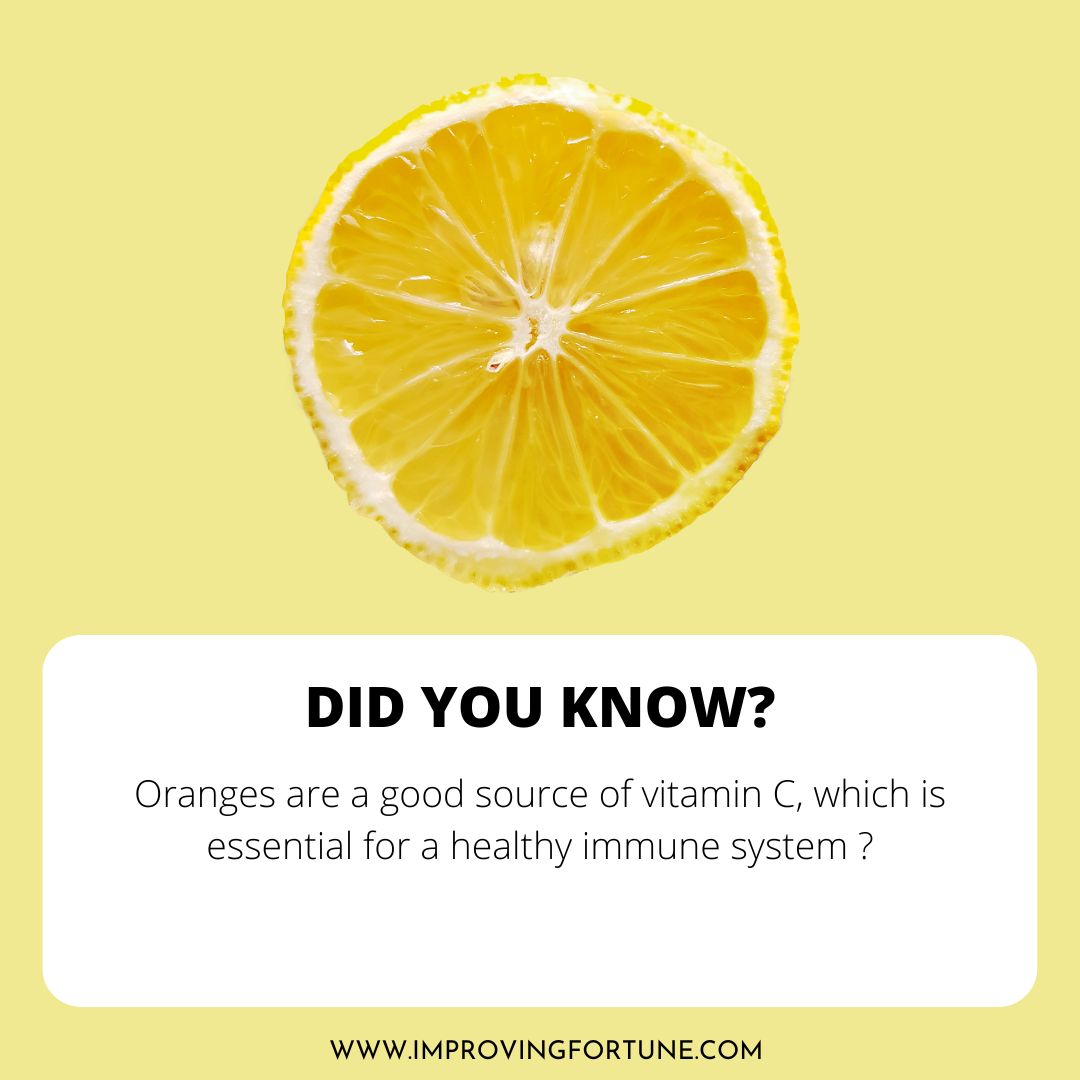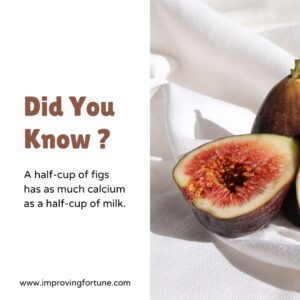Fun Facts About Oranges and it’s Health Benefits
Oranges are a delicious and refreshing fruit that have been enjoyed for centuries. With their bright colour and juicy texture, they are a popular choice for both snacking and cooking.
But did you know that oranges also have a variety of health benefits? From boosting your immune system to improving your skin health, oranges are a great addition to any diet.
In this blog post, we’ll explore some fun facts about oranges and delve into their many health benefits. So sit back, grab an orange, and let’s get started!
Oranges are one of the most popular and widely consumed fruits in the world. They are not only delicious but also packed with vitamins and minerals that provide numerous health benefits. In this blog post, we will explore some fun facts about oranges and their health benefits.
Fun Facts About Oranges
1. Oranges are native to China but are now grown in many parts of the world, including the United States, Brazil, and Spain.
Oranges have a long history of cultivation and consumption, with China being their original homeland. However, today oranges are grown in various places across the globe, including the United States, Brazil, and Spain.
These countries have all played a significant role in expanding the reach of orange cultivation beyond China. The widespread cultivation of oranges has allowed this beloved fruit to be enjoyed by people all over the world and has made it an important part of many economies. Oranges have been a prized fruit for many centuries, and they can be traced back to ancient China. The first recorded mention of oranges is in Chinese literature from the 4th century BC.
Oranges were highly valued and were used for medicinal purposes as well as for their sweet flavor. The trade in oranges eventually spread to India, the Middle East, and throughout Europe, where they became a popular fruit.
Today, oranges are grown in many parts of the world, including the United States, Brazil, and Spain. These countries have ideal growing conditions for citrus fruits, such as warm climates, fertile soil, and access to water. In the United States, Florida is the leading producer of oranges, followed by California. Oranges are a versatile fruit and can be eaten fresh, used in cooking and baking, or made into juice.
They are a good source of vitamin C, dietary fiber, and other important nutrients. Oranges also contain antioxidants, which help to protect the body against harmful free radicals.
In addition to their nutritional benefits, oranges are also used in many cultural traditions and celebrations. In the United States, oranges are often associated with Christmas and are used to decorate Christmas trees and wreaths.
In Chinese culture, oranges are considered a symbol of good luck and are often given as gifts during the Lunar New Year. Overall, oranges are a beloved fruit that have a rich history and are enjoyed by people around the world. Whether you are eating them fresh or using them in your favourite recipes, oranges offer a delicious and healthy way to add flavour and nutrition to your diet.
2. There are over 400 varieties of oranges, but the most common ones are Navel, Valencia, and Blood.
Oranges have always been a popular fruit for its refreshing flavour and numerous health benefits. This healthy treat is widely consumed across the globe and has become a staple ingredient in many recipes.
However, did you know that there are over 400 varieties of oranges? Despite being a popular fruit, the average person may not be aware of the vast array of oranges available. In this article, we will be discussing the most common types of oranges, which are the Navel, Valencia, and Blood oranges.
The Navel orange is one of the most recognisable varieties due to its unique “belly button” or navel-like formation on the bottom centre of the fruit. This orange is seedless, making it perfect for snacking and is also popular for juicing as it yields a considerable amount of juice. Navel oranges are typically in season from November to April in the United States but can be found at various times throughout the year.
Valencia oranges are another popular type. Most people associate these oranges with their exceptional sweetness and juiciness. Valencia oranges are picked when they are fully mature on the tree, making them a versatile fruit that can be used in sweet and savory dishes, as well as in juice. These oranges thrive in the hot climate of California and are typically in season from March to June in the United States.
Lastly, we have Blood oranges, which are visually striking because of their bright red or deep purple flesh. They have a sweet flavour that is often described as being less tart than regular oranges. Blood oranges also have a higher concentration of antioxidants, which makes them an excellent choice for those looking to boost their immune system. These oranges are in season from December till May in the United States.
While we may be aware of oranges and their health benefits, it is important to realise that there are many different varieties to choose from. The Navel, Valencia, and Blood oranges are the most common types that you are likely to come across in your grocery store. Each type has its unique flavour profile, and it’s worth trying each of them to discover your personal preference. Whether you prefer sweet, seedless, or a unique flavour profile, oranges are an excellent source of vitamin C, folate, and potassium, making them an essential part of a healthy diet.
3. Oranges are a good source of vitamin C, which is essential for a healthy immune system.
Oranges, known for their sweet, refreshing taste, are not only delicious but also a powerhouse of nutrients. One of the key nutrients found in oranges is vitamin C, which plays a crucial role in ensuring the health of our immune system.
Vitamin C is an essential nutrient for our health, as it helps our body fight off infections and maintain a healthy immune system. It is not produced by the body, which means we need to get it from external sources, such as food. That’s where oranges come in – they are one of the richest sources of this important nutrient.
A single medium-sized orange contains around 70 milligrams of vitamin C, which is more than our recommended daily intake. Consuming oranges regularly can help boost our immune system and reduce the risk of developing various illnesses, including colds and flu.
In addition to its immune-boosting properties, vitamin C is also an antioxidant, which means it protects our cells from damage caused by free radicals. This can help prevent a variety of health problems, including heart disease, cancer, and premature aging.
Adding oranges to your diet is easy and convenient. You can eat them as a snack, include them in your salads, or squeeze them to make juice. Incorporating this fruit into your diet is an excellent way to ensure you are getting the recommended daily dose of vitamin C.
Oranges are an excellent source of vitamin C, which is vital for maintaining a healthy immune system. Consuming oranges regularly can help protect your body from illness and promote overall wellness. So, the next time you’re looking for a healthy snack, reach for an orange – your body will thank you for it!
4. Orange peels can be used to make zest, which is commonly used in baking and cooking.
Did you know that orange peels can be used to make a flavorful ingredient called zest? Zest is commonly used in baking and cooking to add a citrusy kick to dishes, and it’s easy to make at home using orange peels.
To make zest, you’ll need to start with a few fresh oranges. Wash them thoroughly to remove any dirt or chemicals, and use a sharp knife or peeler to remove the outer layer of skin. You’ll want to avoid getting too much of the white pith, as it can be bitter and spoil the flavour of your zest.
Once you have your orange peels, you can chop them into fine pieces or use a zester or grater to create small shavings. Zest works great in a variety of recipes, like cakes, cookies, breads, and even savory dishes like marinades and stews.
Not only does orange zest add a delicious flavor to your food, it’s packed with nutritional benefits too. Orange peels contain essential oils and antioxidants that can help improve digestion, boost your immune system, and even provide relief from cold and flu symptoms.
So the next time you’re snacking on an orange, don’t throw away those peels! Instead, save them to make some delicious and nutritious zest for your next meal.
5. Oranges were once considered a luxury item and were only available to the wealthy.
Oranges have always been a beloved fruit that is widely consumed all over the world. However, it is a little-known fact that oranges were, for a long time, a luxury item that was only available to the wealthy.
In fact, the history of oranges is quite fascinating, and it goes back centuries.Oranges were first cultivated in Southeast Asia over 4,500 years ago. They were brought to Europe by Arab traders around the 9th century and were initially considered a medicinal fruit due to their high vitamin C content. The fruit’s popularity grew, and it soon became a popular snack. However, due to their rarity and difficulty in transportation, they remained an expensive delicacy.
The wealthy class in medieval Europe had a particular fondness for oranges, and they were consumed as a status symbol. In fact, oranges were so highly prized that they were referred to as “golden apples.” During the Middle Ages, oranges were also believed to have curative properties, and they were used to treat a variety of ailments.
It wasn’t until the late 19th century that oranges became more widely available and affordable. The development of more efficient transportation methods, such as trains and refrigeration, made it possible to transport oranges across longer distances without spoiling. With the increase in supply, the price of oranges dropped, and they became accessible to the middle class.
Today, oranges are readily available in most parts of the world, and they are consumed in many forms, including juice, marmalade, and in salads. They are appreciated not only for their sweet and tangy flavor but also for their high vitamin C content and numerous health benefits.
In conclusion, oranges have come a long way from being a rare delicacy only available to the wealthy to being a household fruit that is enjoyed by people all around the world. The story of oranges is a testament to how advancements in transportation and technology can change the trajectory of a food’s history and make it accessible to all.
Health Benefits of Oranges

1. Boost Immune System: As mentioned earlier, oranges are a good source of vitamin C, which helps to boost the immune system.
Vitamin C stimulates the production of white blood cells, which fight against infections and diseases. Oranges are famously known as a great source of vitamin C, which helps boost the immune system. Vitamin C is an essential nutrient that helps produce white blood cells, which are responsible for fighting off infections and illnesses.
Oranges also contain other antioxidants like flavonoids and beta-carotene that help protect cells from damage and inflammation.
Additionally, oranges are a good source of potassium, which supports healthy blood pressure levels and enhances nerve and muscle function.
Incorporating oranges into your diet can help improve your overall health and boost your immunity, helping you stay healthy and fight off illnesses.
2. Promote Heart Health: Oranges are rich in potassium, which is essential for maintaining a healthy heart. Potassium helps to regulate blood pressure and prevent cardiovascular diseases.
Oranges are a great source of nutrients that promote heart health. One of the most important nutrients in oranges is vitamin C, which can help reduce inflammation in the body and improve blood vessel function.
In addition, oranges are rich in fibre, which can help lower cholesterol levels and reduce the risk of heart disease.
Oranges also contain potassium, which is important for heart health because it can help regulate blood pressure.
Overall, incorporating oranges into your diet can be a great way to support heart health and reduce the risk of heart disease.
3. Fight Cancer: Oranges contain compounds called flavonoids, which have anti-cancer properties. These compounds help to prevent the growth and spread of cancer cells.
Oranges are known for being high in vitamin C, but they also contain other beneficial compounds that may help fight cancer.
Oranges are a good source of flavonoids, which are antioxidants that can protect cells from damage caused by harmful molecules known as free radicals.
Additionally, oranges contain limonoids, which have been shown to have anti-cancer properties. Limonoids can help prevent the formation of cancer cells and even induce apoptosis, or cell death, in existing cancer cells. These compounds work together to make oranges a powerful weapon against cancer and a delicious addition to a healthy diet.
4. Improve Digestion: Oranges are a good source of fiber, which is essential for maintaining a healthy digestive system.
Fiber helps to regulate bowel movements and prevent constipation. Oranges are a great source of dietary fiber, which aids in digestion by promoting regular bowel movements and preventing constipation.
The high levels of vitamin C found in oranges also play a role in digestion by strengthening the digestive tract’s lining and reducing inflammation.
Furthermore, oranges contain natural enzymes that help break down food and aid in the absorption of nutrients.
Consuming oranges regularly can improve gut health and overall digestion, leading to a healthier body and improved quality of life.
5. Protect Skin: Oranges are rich in antioxidants, which help to protect the skin from damage caused by free radicals. Free radicals can cause premature aging, wrinkles, and other skin problems.
Oranges are known for their high levels of vitamin C, which is a powerful antioxidant that helps protect the skin from damage caused by free radicals. Free radicals are unstable molecules that can damage skin cells, leading to premature aging, wrinkles, and other signs of skin damage.
Vitamin C also helps boost collagen production, which is a protein that keeps skin firm and elastic.
In addition, oranges contain beta-carotene, which is converted to vitamin A in the body and helps promote healthy skin cell growth. The high water content in oranges also helps keep the skin hydrated, which is essential for maintaining healthy skin.
Overall, incorporating oranges into your diet can help protect and nourish your skin from the inside out.
6. Reduce Inflammation: Oranges contain compounds called polyphenols, which have anti-inflammatory properties. These compounds help to reduce inflammation in the body and prevent chronic diseases.
Oranges are a delicious and nutritious fruit that can help reduce inflammation in the body. This is because they are rich in vitamin C, which is a powerful antioxidant that helps protect cells from damage caused by free radicals.
In addition, oranges also contain flavonoids, which are natural compounds that have anti-inflammatory properties. These flavonoids work by reducing the production of inflammatory molecules in the body, which can help alleviate symptoms of inflammation such as pain and swelling.
By incorporating oranges into your diet, you can benefit from their anti-inflammatory properties and improve your overall health and well-being.
CONCLUSION
Oranges are not only delicious but also packed with nutrients that provide numerous health benefits. They are a good source of vitamin C, fibre, potassium, and antioxidants, which help to boost the immune system, promote heart health, fight cancer, improve digestion, protect the skin, and reduce inflammation.
So, the next time you reach for a snack, consider grabbing an orange instead of a bag of chips. Your body will thank you for it!






